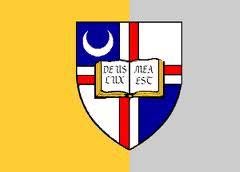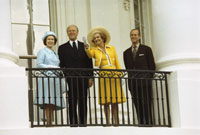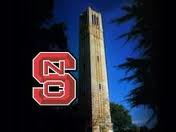- About Archives
- About SAA
- Careers
- Education
- Publications
- Advocacy
- Membership
Dwight D. Eisenhower Presidential Library / Oral Histories Online

The newly developed oral history finding aid for the Dwight D. Eisenhower Presidential Library web site blends digitized versions of three analog sources for each oral history to create a clear and searchable resource. The first element is a list of oral histories with brief descriptions, then electronic versions of the finding aids to compliment them, basically giving an abstract of each interview. During 2009 and 2010, an Eisenhower Library volunteer scanned the original typescript oral history transcripts for which the Library own the rights, and posted them on the online finding aid as well.
You can explore the Eisenhower Presidential Library Orals Histories at: http://eisenhower.archives.gov/Research/Oral_Histories/Oral_Histories.html.
American Catholic History Research Center and University Archives, Catholic University of America

The American Catholic History Research Center and University Archives has been innovative in developing Encoded Archival Description (EAD) templates so that multiple staff members as well as student workers and practicum students can produce collection finding aids that meet national standards. Several of the finding aids link to digital versions of the collections hosted by the WRLC Consortium at http://www.aladin.wrlc.org/dl/.
These finding aids have been developed with limited staff and resources, with a recent notable example being that for the papers of labor activist and priest George G. Higgins at http://libraries.cua.edu/achrcua/higginsfa.html. This finding aid was the result of joint efforts of a full time processor, William Jordan Patty, who did the initial organization but who also left CUA's employment half way through; his supervisor, William John Shepherd, who used a mix of student workers and practicum students to keep the project going; and finally the efforts of a library pre-professional, and library school student, Eben Dennis, who learned on the job under Mr. Shepherd's tutelage to finish the project.
You can explore the American Catholic History Research Center finding aid resources at: http://libraries.cua.edu/achrcua/findaid.html.
The Digital Ford Presidential Library

The Gerald R. Ford Presidential Library has digitized approximately 20,000 pages of material to date and has made them available on the Ford Library web site. As a primary focus, the project aims to link the digital copies of items to preexisting online finding aids, providing a jumping off point for researchers. The new resource page includes the projects completed during 2009 and 2010, previously digitized documents, and links to related materials on other sites.
You can explore the Ford Presidential Library digital resources at: http://www.fordlibrarymuseum.gov/library/docs.asp.
North Carolina State University Libraries Special Collections Research Center Finding Aid Redesign

Believing that well-designed descriptive tools increase visibility and access to special collections, NCSU Libraries reengineered the structure of archival finding aids to maximize usability for both novice and advanced researchers. To communicate the purpose of finding aids to users, NCSU Libraries has renamed them "collection guides." Individual collection records are presented in a tabbed display that facilitates greater clarity of content and better understanding of the structure of archival collections. Usability studies have shown that many users get lost in the structure of traditional paper finding aids. An icon in the search results list and a tab in the collection guide display alert users to available online content within a collection, thereby increasing awareness of and accessibility to digital materials within collections.
NCSU Libraries has also incorporated robust search functionality, including features such as full-text searching, fielded searching, faceted browsing and highlighting of search results. In addition, users can now save collection records in a virtual book-bag while continuing to search for additional materials. Atom feeds allow users to subscribe to areas of the collections in which they have specific research interests. Consistent encoding of collection guides allows for integration of EADs into other environments, including their integration into the online catalog for the Triangle Research Libraries Network consortium.
You can explore the North Carolina State University's new collection guides application at: http://www.lib.ncsu.edu/findingaids.
Northwest Digital Archives (NWDA)

The Northwest Digital Archives (NWDA) provides enhanced access to archival and manuscript collections in Idaho, Montana, Oregon, Alaska, and Washington through a union database of Encoded Archival Description (EAD) finding aids. See the Contact Us page for a list of the NWDA consortium members. Significant subject commonalties include the major economic forces in the region- agriculture, forest, products, fisheries, and natural resources; urban and rural social and progressive movements; local state, regional, and national politics; outdoor recreation; Native American language and culture; and the place of religious communities in the region. The Northwest Digital Archives was funded by the National Endowment for the Humanities for July 2002 through December 2004 (Phase I) and July 2005 through June 2007 (Phase 2). Processing and finding aid improvements at six participating institutions was funded by the National Historical Publications and Records Commission for July 2002 through December 2004 (Phase 1) and July 2005 through June 2007 (Phase 2). As of July 2007, NWDA is a program of the Orbis Cascade Alliance.
You can explore the Northwest Digital Archives resources at: http://nwda.wsulibs.wsu.edu/.
International Holocaust Era Assets Project (National Archives and Records Administration)

*Please note that this resource is under development and some links may be inactive. A fuller, formal launch is scheduled for Spring 2011.
This web portal links researchers world-wide who are searching for archival materials about cultural objects looted during World War II. These archival materials consist of descriptions of records and, in many cases, digital images of the records themselves. This site is a collaborative effort of the Joint International Project to Extend Access to Records Relating to Holocaust-Era Looted Cultural Property to support provenance and other research. The website content will grow over time to encompass different aspects of the activities involving cultural property (e.g., looting, identification, recovery, and restitution) as well as records of additional member organizations or institutions. Each member organization has identified the key groups of relevant records among its holdings.
The project provides descriptions of relevant groups of records identified by the member institutions, makes available a large proportion of these records online, and serves as a guide to the use of these records.
You can explore the International Holocaust Era Assets Project online at: http://www.archives.gov/research/holocaust/international-resources/.
Home | Annual Reports | Standing Rules | Description Expo | Descriptive Notes | Minutes | Reports & Presentations | Section Leadership